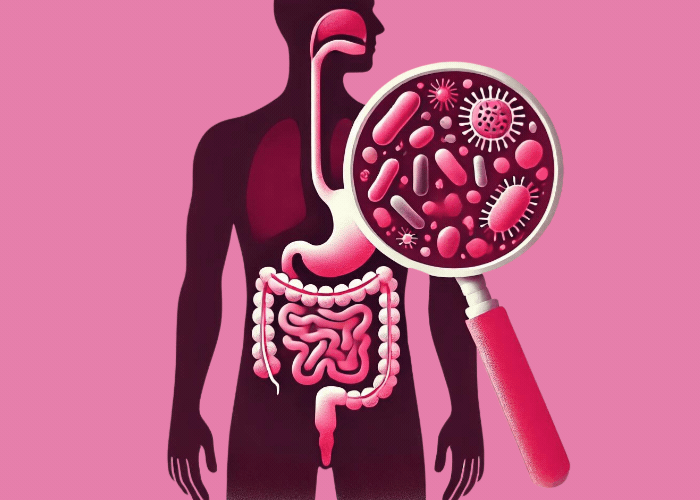The intestines are the engines of our bodies and our biggest contact surface with the outside world. Everything we eat passes through our mouth into the stomach and eventually lands in our intestines. The latter is a sensitive and complex system that has to be nurtured and cared for, just like a garden. It is not without reason that our intestines are the core of our health. Our intestines perform important tasks and processes that are essential for the entire body. If the intestinal flora, i.e. the bacterial colonisation of the intestines, is impaired in any way, the intestines aren’t able to absorb vital nutrients and minerals. This, in turn, interferes with our wellbeing. Certain environmental factors, over which we have no direct control, can harm us and our intestines. These include noise, pollution and water quality. There are, however, some factors which we can control and that have a significant impact on our intestinal health:
1. The right food for the intestines

Foods are a vital necessity. The average person can only survive for 1 to 4 days without food or water. However, our food intake has changed quite a bit over the last few decades. Our daily lives are becoming more stressful, and we have less time to consciously eat and choose the right foods. Food doesn’t just satiate our hunger, it’s also essential so that our bodies can perform their daily tasks. Make sure you eat regularly with a balanced combination of the right foods. You should consume fresh veggies and fruit, whole grain products, the occasional fish, meat and dairy product, as well as plenty of water (at least 2 litres a day). Try to avoid excessive sugar, fat and conservatives.
Find out more about eating and the mircobiome
2. Stress – what does it do to our intestinal health?
A fast-paced daily life has become quite normal in our modern society. Stress prepares our bodies for situations in which we require increased attention and performance. Our entire bodies are in a “state of emergency”. If stress occurs frequently or constantly, it is not just unpleasant but can also harm our bodies.
Our intestinal health is essential for our stress resistance – the “healthier” our intestinal flora, the better our protection against stress. The intestinal bacteria have a direct impact on the connection between the brain and the intestines (the so-called brain-gut-axis) and influence the body’s response towards stress. Specially selected bacterial strains can reduce inflammation and help prepare the intestines against stress. Probiotics contain lactobacilli and bifidobacteria, which are permanent inhabitants of healthy and balanced intestines. Constant stress puts the body under immense strain and brings the helpful and “bad” bacteria out of balance. New “teams” of intestinal bacteria can help restore the stress-induced lack of good bacteria. They improve the barrier of the intestinal mucosa, support the immune cells (80% of which are found in intestinal tissue), and reduce the release of histamine.
Discover more about the side effects of stress
 3. Our minds are affected by our intestines
3. Our minds are affected by our intestines
Research about the brain-gut-axis has stepped into the spotlight over the last few years. Our brain-gut-axis is the close connection and intense two-way exchange of information between the intestines and the brain. Our intestinal flora is one of the central components of this axis, or rather, the various metabolic products that are produced by our helpful intestinal bacteria. They produce, among others, important amino acids (such as tryptophan, which is needed for the production of serotonin) and short-chain fatty acids (e.g., butyrate), both of which influence emotions, concentration and stress resistance.
Click here to read more about the microbiome and depression
4. Exercise helps digestion
Nowadays, many jobs can be done while sitting or in front of a computer. The lack of exercise and the constant sitting can play a decisive role in constipation and bloating. If the food bolus stays in the intestines for too long, so do the harmful substances. The resulting metabolites of these substances are then very difficult to remove from the body. Subsequently, this results in the blockage of the lymphatic system. A lack of exercise can also have a negative impact on type 1 diabetes. In addition, a combination of diabetes with a diet low in fibres can also trigger diverticula (protrusions of the intestines). Experts also consider a lack of exercise to be a cause for the development of intestinal tumours. Gentle runs already improve the perfusion of the intestines, increase intestinal motility and shorten the time that food needs to pass through the intestines. That is also a reason why active people seldomly suffer from constipation, bloating or the feeling of fullness.
Find out more about the impact of sport in our intestinal flora
5. Drugs (antibiotics) unbalance the intestinal flora
The balanced bacterial colonisation of the intestines really does create a good gut feeling: It is essential for various processes in the entire organism and responsible for our health. Drugs have a strong impact on the microbiome and, vice versa, the intestinal bacteria determine the efficacy of the drugs. Drugs such as antihistamines, blood sugar, blood pressure and cholesterol-lowering drugs, cortisol, antidepressants, hormonal products and contraceptives all influence the bacteria in the intestines. One study showed that at least 25% of all drugs have a significant impact on the intestinal microbiome. Besides influencing the growth and function of the bacteria, they also impair the intestinal barrier, intestinal motility (muscular movement in the intestines) and intestinal immune system.
Antibiotics can’t differentiate between “good” and “bad” bacteria and, therefore, decimate the intestines. The helpful intestinal flora is massively damaged which leads to an inflammation of the intestinal mucosa. The destruction of the helpful intestinal flora also affects our natural “defence”. Ultimately, aggressive, pathogenic and antibiotic-resistant germs can multiply with ease.
More on drugs and the intestinal flora
6. Probiotic bacteria strains for a healthy intestinal flora

Maintaining a healthy intestinal flora isn’t just essential for good digestion. During chronic inflammation, the intestines play a central role in the human immune system and health thanks to its connections throughout the entire body. There are two ways to maintain the vital diversity of intestinal bacteria and create a perfect environment. The first is the intake of food for the healthy bacteria in the form of prebiotics. These contain soluble fibres such as pectin, inulin and oligofructose. They are naturally found in many foods like beans, lentils and peas, certain types of vegetables and nuts. You can also get the right amount of these substances by taking targeted prebiotic products from your local pharmacy. The second option is the intake of probiotics to remove harmful bacteria and restore balance within the microbiome. Again, it is best to take selected products from the pharmacy. These products all fulfil strict quality criteria, and their positive effects on human wellbeing have been proven in scientific studies.



























